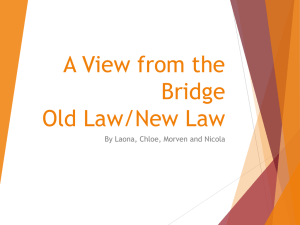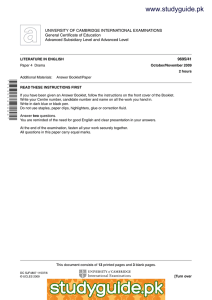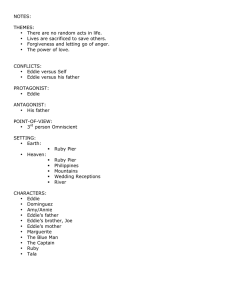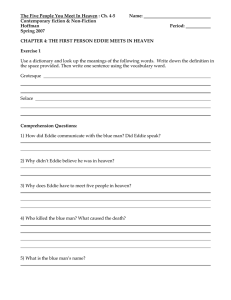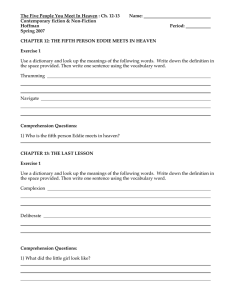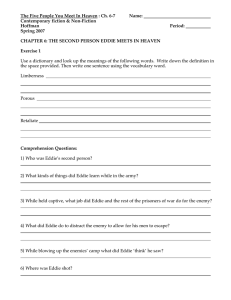www.XtremePapers.com
advertisement
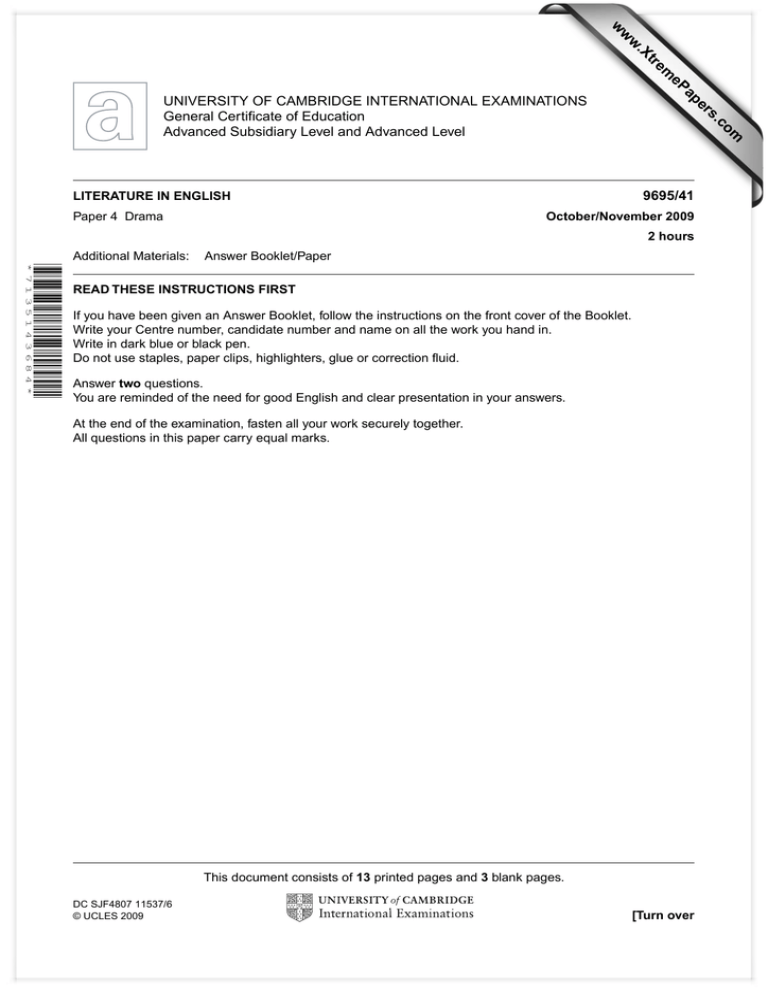
w w om .c s er 9695/41 LITERATURE IN ENGLISH Paper 4 Drama ap eP m e tr .X w UNIVERSITY OF CAMBRIDGE INTERNATIONAL EXAMINATIONS General Certificate of Education Advanced Subsidiary Level and Advanced Level October/November 2009 2 hours Additional Materials: Answer Booklet/Paper *7135143684* READ THESE INSTRUCTIONS FIRST If you have been given an Answer Booklet, follow the instructions on the front cover of the Booklet. Write your Centre number, candidate number and name on all the work you hand in. Write in dark blue or black pen. Do not use staples, paper clips, highlighters, glue or correction fluid. Answer two questions. You are reminded of the need for good English and clear presentation in your answers. At the end of the examination, fasten all your work securely together. All questions in this paper carry equal marks. This document consists of 13 printed pages and 3 blank pages. DC SJF4807 11537/6 © UCLES 2009 [Turn over 2 ATHOL FUGARD: Township Plays 1 Either (a) ‘We compound our suffering by victimizing each other.’ (Athol Fugard) In what ways have you seen this idea in action in the Township Plays? Or (b) Show how Fugard develops the relationship between Queeny and Johnny in the following passage from Nongogo. Queeny: Johnny … suppose I want to. Suppose I really want to. Johnny: But why? You’re making better money here than I will ever get from selling rags. Queeny: You saw how. Did you like what you saw? Answer me. Johnny [Pause.]: No. 5 Queeny: And you talked a lot about changing things. Give me a chance. Johnny: But if it doesn’t work … I can’t pay you back. Queeny: Ten pounds isn’t going to break me, Johnny. In any case I want to be your partner … I want to be part of it. You got the idea, I give the money. That’s fair isn’t it? 10 [Johnny is beginning to waver.] Johnny: It might work. Queeny: Of course it would. When I heard your ideas I thought they was good. I would have bought. Other women will be the same. Johnny: I’ve worked it out at fifty per cent profit. Queeny: That’s good legitimate business. Johnny: And there’s big possibilities … I mean for expansion. Queeny: Ja? Johnny: Sure. To begin with, I’d sell the material myself, going from door to door. But if it catches on and the profit is like I said … well, we’d build up a big 20 stock and that could mean a shop. Queeny: With them coming to us. Johnny: You’ve got the idea. Queeny: A shop … with counters, and all the stuff behind … And a name! We got to have a name for the shop. 25 Johnny: We’d find one. 15 [At this point the street door opens quietly and Blackie comes in. He is holding a clock. During the ensuing scene he tries with small furtive gestures to catch Queeny’s attention. It is obviously her clock, but in the excitement of her talk with Johnny she does not see him.] 30 Queeny: We’d open it up at nine in the morning. That’s the time any decent shop opens, and we’d be busy with all the customers coming and going and at five o’clock we’d close up, count up our money and think about tomorrow. You know something? Johnny: What? Queeny: We’d be respectable. Johnny: There’s nothing to be ashamed of. Queeny: Johnny, it’s the best thing I’ve ever heard of. When do we start? © UCLES 2009 35 9695/41/O/N/09 3 Johnny: Well … look Queeny, don’t you want to think about it for a day or so …? [Her answer is to go to the sideboard, take out her money box, count out 40 ten notes and put them on the table in front of Johnny.] Queeny: There. I thought about it and that’s my answer. Johnny: Right now? Queeny: Take advice from somebody who knows … don’t waste time or chances. Now. Tomorrow’s pay day around here. Get your material in the morning 45 and sell in the afternoon. That’s when the women get back with their men’s pay. [Johnny still hesitates.] Take it! If we don’t start now maybe we will never. Act 1 © UCLES 2009 9695/41/O/N/09 [Turn over 4 WILLIAM SHAKESPEARE: Twelfth Night 2 Either (a) What does Shakespeare suggest about the nature of love through his presentation of the relationship between Orsino and Olivia? Or (b) What, in your view, is the dramatic significance of the passage below at this point in the play? Enter SEBASTIAN and ANTONIO. Sebastian: I would not by my will have troubled you; But since you make your pleasure of your pains, I will no further chide you. Antonio: Sebastian: Antonio: I could not stay behind you: my desire, More sharp than filed steel, did spur me forth; And not all love to see you – though so much As might have drawn one to a longer voyage – But jealousy what might befall your travel, Being skilless in these parts; which to a stranger, Unguided and unfriended, often prove Rough and unhospitable. My willing love, The rather by these arguments of fear, Set forth in your pursuit. My kind Antonio, I can no other answer make but thanks, And thanks, and ever thanks; and oft good turns Are shuffl’d off with such uncurrent pay; But were my worth as is my conscience firm, You should find better dealing. What’s to do? Shall we go see the reliques of this town? 10 15 20 To-morrow, sir; best first go see your lodging. Sebastian: I am not weary, and ’tis long to night; I pray you, let us satisfy our eyes With the memorials and the things of fame That do renown this city. Antonio: 5 Would you’d pardon me. I do not without danger walk these streets: Once in a sea-fight ’gainst the Count his galleys I did some service; of such note, indeed, That, were I ta’en here, it would scarce be answer’d. 25 30 Sebastian: Belike you slew great number of his people. Antonio: Th’ offence is not of such a bloody nature; Albeit the quality of the time and quarrel Might well have given us bloody argument. It might have since been answer’d in repaying What we took from them; which, for traffic’s sake, Most of our city did. Only myself stood out; For which, if I be lapsed in this place, I shall pay dear. Sebastian: © UCLES 2009 Do not then walk too open. 9695/41/O/N/09 35 40 5 Antonio: It doth not fit me. Hold, sir, here’s my purse; In the south suburbs, at the Elephant, Is best to lodge. I will bespeak our diet, Whiles you beguile the time and feed your knowledge With viewing of the town; there shall you have me. 45 Sebastian: Why I your purse? Antonio: Haply your eye shall light upon some toy You have desire to purchase; and your store, I think, is not for idle markets, sir. 50 Sebastian: I’ll be your purse-bearer, and leave you for An hour. Antonio: To th’ Elephant. Sebastian: I do remember. [Exeunt] Act 3, Scene 3 © UCLES 2009 9695/41/O/N/09 [Turn over 6 WILLIAM SHAKESPEARE: Julius Caesar 3 Either (a) ‘On every level, it is a play about betrayal, both of oneself and of others.’ How, in your view, does Shakespeare dramatize ideas of betrayal in Julius Caesar? Or (b) Comment closely on the following scene, paying particular attention to the ways in which it develops an audience’s understanding of Antony at this point in the play. Enter ANTONY, OCTAVIUS and LEPIDUS. Antony: These many, then, shall die; their names are prick’d. Octavius: Your brother too must die. Consent you, Lepidus? Lepidus: I do consent. Octavius: Prick him down, Antony. Lepidus: Upon condition Publius shall not live, Who is your sister’s son, Mark Antony. Antony: He shall not live; look, with a spot I damn him. But, Lepidus, go you to Caesar’s house; Fetch the will hither, and we shall determine How to cut off some charge in legacies. Lepidus: 5 10 What, shall I find you here? Octavius: Or here or at the Capitol. [Exit Lepidus. Antony: This is a slight unmeritable man, Meet to be sent on errands. Is it fit, The threefold world divided, he should stand One of the three to share it? Octavius: So you thought him, And took his voice who should be prick’d to die In our black sentence and proscription. Antony: © UCLES 2009 Octavius, I have seen more days than you; And though we lay these honours on this man, To ease ourselves of divers sland’rous loads, He shall but bear them as the ass bears gold, The groan and sweat under the business, Either led or driven as we point the way; And having brought our treasure where we will, Then take we down his load, and turn him off, Like to the empty ass, to shake his ears And graze in commons. Octavius: You may do your will; But he’s a tried and valiant soldier. Antony: So is my horse, Octavius, and for that I do appoint him store of provender. It is a creature that I teach to fight, To wind, to stop, to run directly on, His corporal motion govern’d by my spirit. And, in some taste, is Lepidus but so: 9695/41/O/N/09 15 20 25 30 35 7 He must be taught, and train’d, and bid go forth; A barren-spirited fellow; one that feeds On abjects, orts, and imitations, Which, out of use and stal’d by other men, Begin his fashion. Do not talk of him But as a property. And now, Octavius, Listen great things: Brutus and Cassius Are levying powers; we must straight make head; Therefore let our alliance be combin’d, Our best friends made, our means stretch’d; And let us presently go sit in council How covert matters may be best disclos’d, And open perils surest answered. Octavius: Let us do so; for we are at the stake, And bay’d about with many enemies; And some that smile have in their hearts, I fear, Millions of mischiefs. [Exeunt. 40 45 50 55 Act 4, Scene 1 © UCLES 2009 9695/41/O/N/09 [Turn over 8 TOM STOPPARD: Rosencrantz and Guildenstern are Dead 4 Either (a) ‘There must have been a moment at the beginning, when we could have said no. But somehow we missed it.’ Are Rosencrantz and Guildenstern anything more than victims of circumstance? Or (b) Comment closely on the following passage, considering its dramatic significance in the play. (Act 2. The whole mime...heavy with Death) Content has been removed for copyright reasons. © UCLES 2009 9695/41/O/N/09 9 © UCLES 2009 9695/41/O/N/09 [Turn over 10 ARTHUR MILLER: A View from the Bridge 5 Either (a) Why and how, in A View from the Bridge, does Rodolpho represent such a threat to Eddie’s view of the world? Or (b) Comment closely on the following scene, discussing its effectiveness as the climax to the play’s action. Beatrice: You want somethin’ else, Eddie, and you can never have her! Catherine [in horror]: B.! Eddie [shocked, horrified, his fists clenching]: Beatrice! [MARCO appears outside, walking towards the door from a distant point.] 5 Beatrice [crying out, weeping]: The truth is not as bad as blood, Eddie! I’m tellin’ you the truth – tell her good-bye for ever! Eddie [crying out in agony]: That’s what you think of me – that I would have such a thoughts? [His fists clench his head as though it will burst.] Marco [calling near the door outside]: Eddie Carbone! 10 [EDDIE swerves about; all stand transfixed for an instant. People appear outside.] Eddie [as though flinging his challenge]: Yeah, Marco! Eddie Carbone. Eddie Carbone. Eddie Carbone. [He goes up the stairs and emerges from the apartment. RODOLPHO streaks up and out past him and runs to 15 MARCO.] Rodolpho: No, Marco, please! Eddie, please, he has children! You will kill a family! Beatrice: Go in the house! Eddie, go in the house! Eddie [– he gradually comes to address the people]: Maybe he come to apologize to me. Heh, Marco? For what you said about me in front of the 20 neighbourhood? [He is incensing himself and little bits of laughter even escape him as his eyes are murderous and he cracks his knuckles in his hands with a strange sort of relaxation.] He knows that ain’t right. To do like that? To a man? Which I put my roof over their head and my food in their mouth? Like in the Bible? Strangers I never seen in my whole life? 25 To come out of the water and grab a girl for a passport? To go and take from your own family like from the stable – and never a word to me? And now accusations in the bargain! [Directly to MARCO] Wipin’ the neighbourhood with my name like a dirty rag! I want my name, Marco. [He is moving now, carefully, towards MARCO.] Now gimme my name 30 and we go together to the wedding. Beatrice and Catherine [keening]: Eddie! Eddie, don’t! Eddie! Eddie: No, Marco knows what’s right from wrong. Tell the people, Marco, tell them what a liar you are! [He has his arms spread and MARCO is 35 spreading his.] Come on, liar, you know what you done! [He lunges for MARCO as a great hushed shout goes up from the people. MARCO strikes EDDIE beside the neck.] Marco: Animal! You go on your knees to me! [EDDIE goes down with the blow and MARCO starts to raise a foot to 40 stomp him when EDDIE springs a knife into his hand and MARCO steps back. LOUIS rushes in towards EDDIE.] © UCLES 2009 9695/41/O/N/09 11 Louis: Eddie, for Christ’s sake! [EDDIE raises the knife and LOUIS halts and steps back.] Eddie: You lied about me, Marco. Now say it. Come on now, say it! Marco: Anima-a-a-l! 45 [EDDIE lunges with the knife. MARCO grabs his arm, turning the blade inward and pressing it home as the women and LOUIS and MIKE rush in and separate them, and EDDIE, the knife still in his hand, falls to his knees before MARCO. The two women support him for a moment, 50 calling his name again and again.] Catherine: Eddie, I never meant to do nothing bad to you. Eddie: Then why – Oh, B! Beatrice: Yes, yes! Eddie: My B.! 55 [He dies in her arms, and BEATRICE covers him with her body.] Act 2 © UCLES 2009 9695/41/O/N/09 [Turn over 12 OSCAR WILDE: The Importance of Being Earnest 6 Either (a) ‘Not so much a comedy of manners as a comedy of bad manners.’ How far do you agree with this assessment of the play? Or (b) With close reference to the following scene, show how Wilde establishes both tone and character at the beginning of the play. Morning-room in ALGERNON’s flat in Half-Moon Street. The room is luxuriously and artistically furnished. The sound of a piano is heard in the adjoining room. [LANE is arranging afternoon tea on the table and, after the music has ceased, ALGERNON enters.] Algernon: Did you hear what I was playing, Lane? Lane: I didn’t think it polite to listen, sir. Algernon: I’m sorry for that, for your sake. I don’t play accurately – anyone can play accurately – but I play with wonderful expression. As far as the piano is concerned, sentiment is my forte. I keep science for Life. 10 Lane: Yes, sir. Algernon: And, speaking of the science of Life, have you got the cucumber sandwiches cut for Lady Bracknell? Lane: Yes, sir. [Hands them on a salver.] 5 Algernon [Inspects them, takes two, and sits down on the sofa ]: Oh! … by the way, 15 Lane, I see from your book that on Thursday night, when Lord Shoreman and Mr Worthing were dining with me, eight bottles of champagne are entered as having been consumed. Lane: Yes, sir; eight bottles and a pint. Algernon: Why is it that at a bachelor’s establishment the servants invariably 20 drink the champagne? I ask merely for information. Lane: I attribute it to the superior quality of the wine, sir. I have often observed that in married households the champagne is rarely of a first-rate brand. Algernon: Good heavens! Is marriage so demoralizing as that? Lane: I believe it is a very pleasant state, sir. I have had very little experience of it myself up to the present. I have only been married once. That was in consequence of a misunderstanding between myself and a young person. 25 Algernon [languidly]: I don’t know that I am much interested in your family life, 30 Lane. Lane: No, sir; it is not a very interesting subject. I never think of it myself. Algernon: Very natural, I am sure. That will do, Lane, thank you. Lane: Thank you, sir. [LANE goes out.] Algernon: 35 Lane’s views on marriage seem somewhat lax. Really, if the lower orders don’t set us a good example, what on earth is the use of them? They seem, as a class, to have absolutely no sense of moral responsibility. [Enter LANE.] © UCLES 2009 40 9695/41/O/N/09 13 Lane: Mr Ernest Worthing. [Enter JACK. LANE goes out.] Algernon: How are you, my dear Ernest? What brings you up to town? Jack: Oh, pleasure, pleasure! What else should bring one anywhere? Eating as usual, I see, Algy! 45 Algernon [stiffly]: I believe it is customary in good society to take some slight refreshment at five o’clock. Where have you been since last Thursday? Jack [sitting down on the sofa]: In the country. Algernon: What on earth do you do there? 50 Jack [pulling off his gloves ]: When one is in town one amuses oneself. When one is in the country one amuses other people. It is excessively boring. Algernon: And who are the people you amuse? Jack [airily]: Oh, neighbours, neighbours. Algernon: Got nice neighbours in your part of Shropshire? Jack: Perfectly horrid! Never speak to one of them. Algernon: How immensely you must amuse them! [Goes over and takes sandwich.] By the way, Shropshire is your county, is it not? Jack: Eh? Shropshire? Yes, of course. Hallo! Why all these cups? Why cucumber sandwiches? Why such reckless extravagance in one so 60 young? Who is coming to tea? 55 Act 1 © UCLES 2009 9695/41/O/N/09 14 BLANK PAGE 9695/41/O/N/09 15 BLANK PAGE 9695/41/O/N/09 16 BLANK PAGE Copyright Acknowledgements: Question 1 Question 4 Question 5 © Athol Fugard; Township Plays; pp.81-83; Oxford University Press; 1993; 0-19-282923-4. © Tom Stoppard; Rosencrantz and Guildenstern are Dead; pp.74-77; Faber and Faber; 2000; 0-571-08182-7. © Arthur Miller; A View from the Bridge; pp.83-84; Penguin 2000. Permission to reproduce items where third-party owned material protected by copyright is included has been sought and cleared where possible. Every reasonable effort has been made by the publisher (UCLES) to trace copyright holders, but if any items requiring clearance have unwittingly been included, the publisher will be pleased to make amends at the earliest possible opportunity. University of Cambridge International Examinations is part of the Cambridge Assessment Group. Cambridge Assessment is the brand name of University of Cambridge Local Examinations Syndicate (UCLES), which is itself a department of the University of Cambridge. 9695/41/O/N/09

